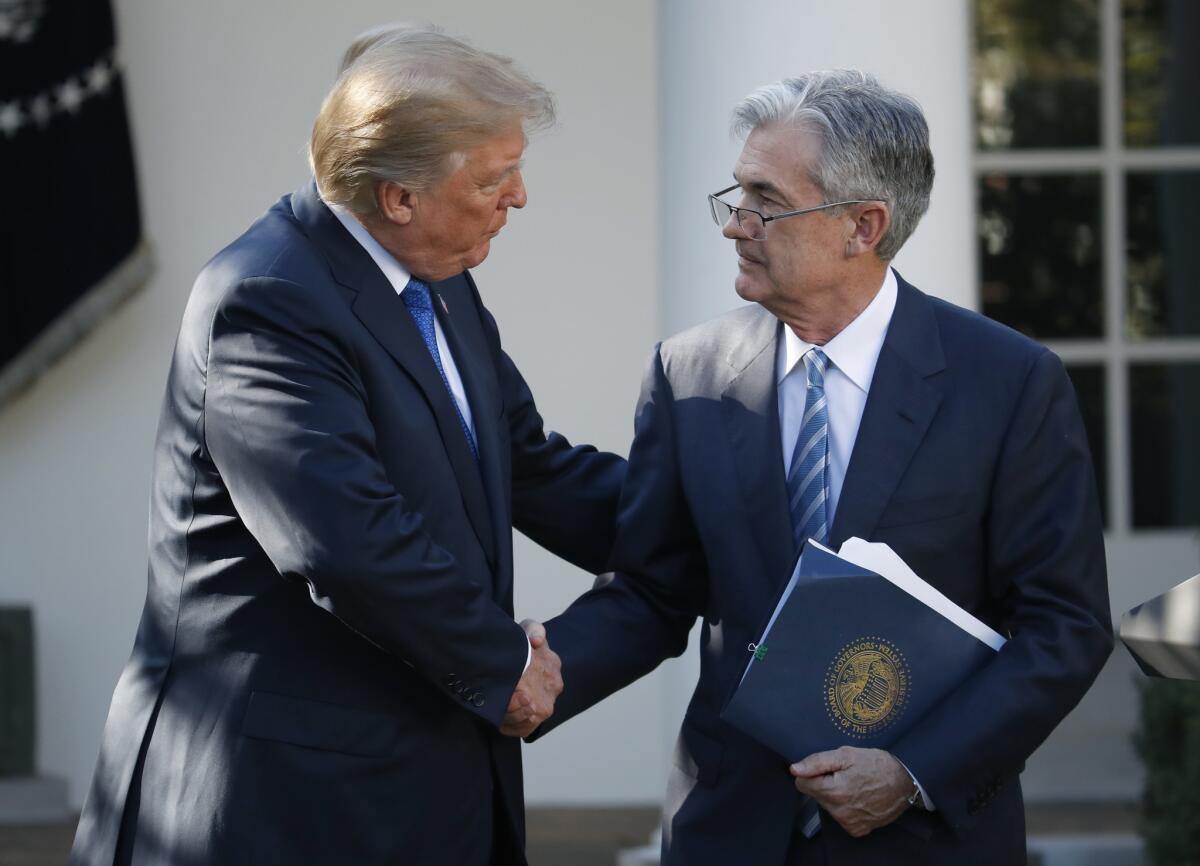Opinion: Welcome, Jay Powell, to the ranks of Trump’s public enemies

- Share via
In his customary morning burst of 280-character invective, President Trump lashed out at China on Friday for daring to impose new tariffs on $75 billion worth of U.S. goods in response to Trump’s latest round of tariffs on an estimated $111 billion worth of Chinese products.
“They have stolen our Intellectual Property at a rate of Hundreds of Billions of Dollars a year, & they want to continue. I won’t let that happen! We don’t need China and, frankly, would be far better off without them,” he tweeted. But the new King of Israel was just getting warmed up. He went on to declare, “Our great American companies are hereby ordered to immediately start looking for an alternative to China, including bringing your companies HOME and making your products in the USA.”
Because a president can do that, right? Unilaterally order private businesses to change their business plans and relocate? Oh, wait — he can’t.
For good measure, Trump added that he was “ordering all carriers, including Fed Ex, Amazon, UPS and the Post Office, to SEARCH FOR & REFUSE all deliveries of Fentanyl from China (or anywhere else!).” On that front, at least, he’s likely to be on firmer footing.
So clearly, the president wasn’t happy with China on Friday morning. And that makes his tweet about Jerome H. Powell, the man he picked to be chairman of the Federal Reserve Board of Governors, all the more jaw-dropping.
Powell had just given a hotly anticipated speech at a meeting of central bankers in Jackson Hole, Wyo., saying the Fed would be open to cutting its interest-rate target again next month in light of the economic troubles overseas and other potential headwinds for U.S. growth. “We will act as appropriate to sustain the expansion, with a strong labor market and inflation near its symmetric 2% objective,” he reportedly said.
U.S. stock traders had dumped shares after China announced its latest round of retaliatory tariffs, but they seemed encouraged by Powell’s remarks, pushing the Dow back into positive territory. But Trump’s reaction was a bit different:
Let’s see. On the one hand, we have a former investment banker and longtime U.S. public servant who has steered U.S. monetary policy through a period of near-record low unemployment and stable prices. By Fed standards, that’s a total win. On the other hand, we have the leader of the United States’ greatest economic rival and one of its biggest geopolitical adversaries, someone who has directed the militarization of the South China Sea and overseen massive amounts of theft, snooping and other hostile activity online.
This is a question?
Granted, I’m not an impartial arbiter here, being a longtime member of the president’s “enemy of the people” club. And frankly, if I had to choose whom to admit, I’d take Powell, who seems like a good guy and who definitely hasn’t sent any Uighurs to “reeducation” camps.
But it’s all personal for our president, and Powell had the temerity to suggest at Jackson Hole on Friday that Trump’s imposition of tariffs on U.S. manufacturers and consumers might be a bad thing for the economy. Attacking one of Trump’s pet policies isn’t the way to endear oneself to the president, especially when one is steadfastly refusing to align central-bank policies with Trump’s short-term, politically colored vision for managing the economy.
“Trade policy uncertainty seems to be playing a role in the global slowdown and in weak manufacturing and capital spending in the United States,” he said in prepared remarks. Worse, there’s not much the Fed can do to offset the damage, Powell said. “While monetary policy is a powerful tool that works to support consumer spending, business investment and public confidence, it cannot provide a settled rule book for international trade,” Powell said.
The real threat to the U.S. economy Friday wasn’t Powell, it was Trump’s trade policies and public outbursts. Having righted itself by the end of Powell’s speech, the Dow dropped sharply immediately after the president’s Friday tirade. As of this writing, it was down 455 points.
More to Read
A cure for the common opinion
Get thought-provoking perspectives with our weekly newsletter.
You may occasionally receive promotional content from the Los Angeles Times.









